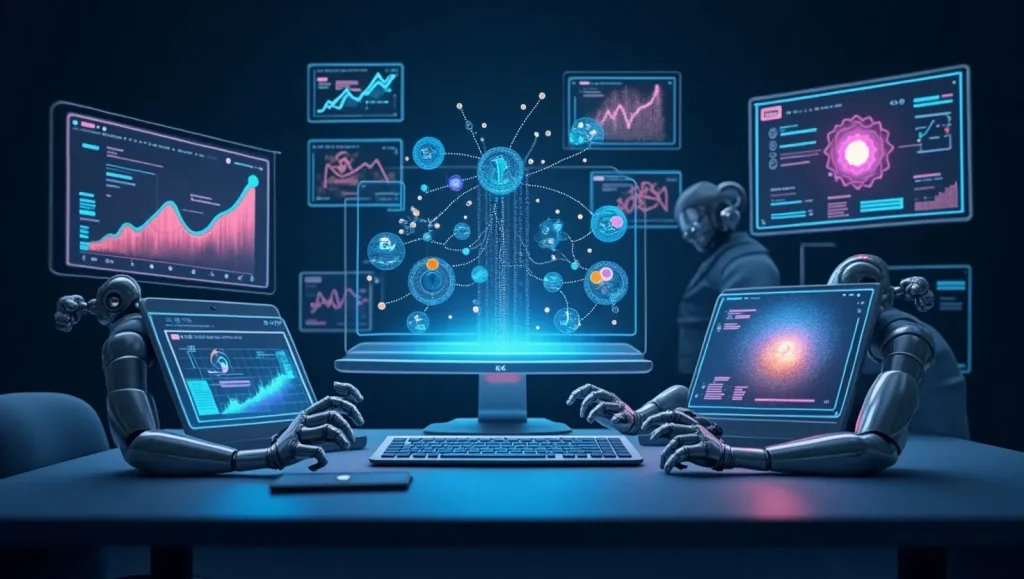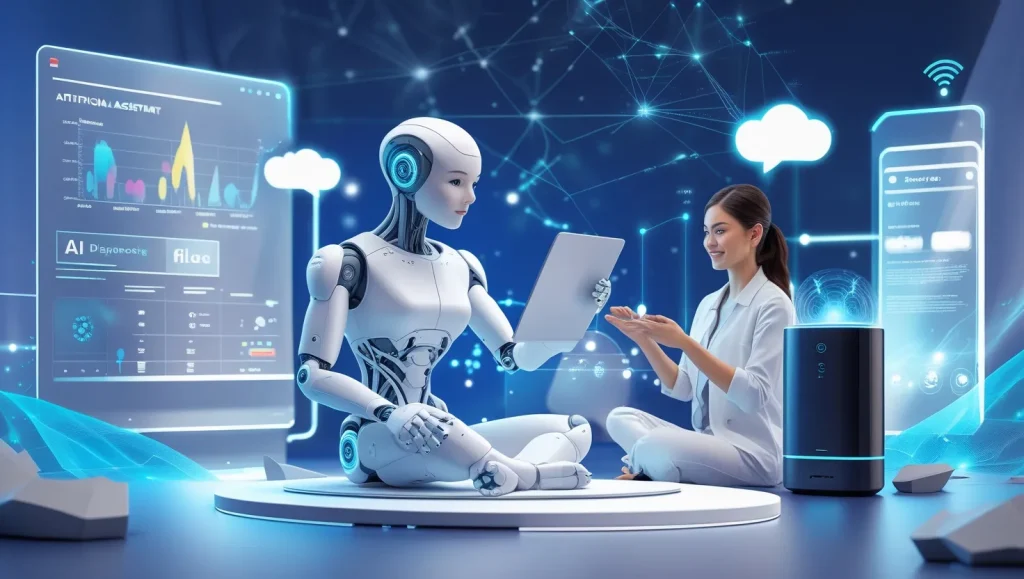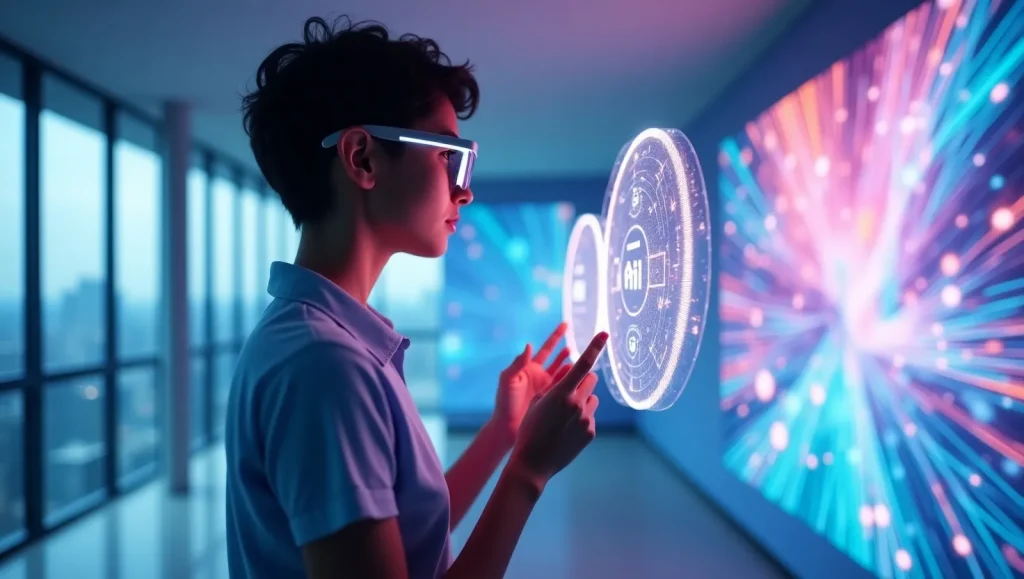
Now introducing, AI for digital marketing has become an important instrument for an organization which aids establishing a business’s online presence in connecting customers more meaningfully. Let’s talk about that-how artificial intelligence is changing the way we do things in digital marketing-and what strategies and technologies can maximize your marketing efforts.
Table of Contents
Introduction to AI in Digital Marketing
Marketing is an ever-dynamic field whose changes have now been accelerated by the advancement of AI and digital marketing. From process automation to data analytics, artificial intelligence has the potential to change the interaction of businesses with their customers and their marketing strategies. Understanding the role of AI in present-day marketing is vital for any business trying to remain competitive in this digital arena.
The New Age Artificial Intelligence in Marketing

In a contemporary flow of marketing, automation of time-consuming and resource-draining old processes is yet another critical aspect of AI. This very automation allows marketing professionals to step into strategic-planning and creative options, while machines handle all mind-numbing tasks such as data analysis, segmentation, and consumer interaction.
The marketers can, thus, change their approach because AI tools also delve deep into consumer behaviors. In addition to tracking consumer behaviors and preferences, AI leverages advanced algorithms and taps into the ocean of big data to provide reliable information about the predicted trends and preferences and buying behavior, thus empowering the companies to make their concrete decisions based on real-time data.
Benefits of Adding an AI Component to Your Marketing
To pursue meaningful integration of AI into marketing strategies-any such actions gives rise to a barrage of benefits-firstly, an increase in efficiency through automation during a task that is somewhat mundane, with consequent elimination of human error and liberation of precious resources. Thus, marketers will find more time for strategies by spending less in the banalities of administration.
Second, AI supports hyper-personalization, which helps brands push tailored content and recommendations based on the preferences of individual customers. This level of personalization proves to be very engaging for the consumer and greatly enhances the possibility to convert.Finally, AI brings the element of right decision-making, thanks to predictive analytics. Relying on historical data-an assortment of which does-the organization is in a good position to determine patterns and trends, predict outcomes going forward, and optimize campaigns for maximum return on investment.
Key Terminology and Concepts in AI for Marketing
This would help in setting the perspective for understanding AI impact on digital marketing. The prominent terms in AI marketing include machine learning, data analytics, customer segmentation, and predictive modeling.
By machine learning, we mean the construction of algorithms self-learn from data, improve their performance, and generally get better over time without being specifically told what to do by programmers. Data analytics is the computed, systematic analysis of data sets to identify patterns and trends. Customer segmentation can be the division of customer space into identifiable parts that will facilitate targeting in marketing. Predictive modeling applies statistical techniques to predict the resulting scenarios based on historical data.
Marketers interested in maximizing AI potential must know all this terminologies. The familiarity would also keep pace with emerging technological advancements, thus requiring the professional to create successful strategies involving AI applications.
Understanding AI Technologies in Digital Marketing
Inasmuch as we discover AI further into Digital Marketing, it becomes critical to understand the specific technologies behind its effectiveness. These technologies include machine learning and data analytics, with each being instrumental in creating marketing strategies.
Machine Learning and Its Applications

Machine Learning is a subfield of Artificial Intelligence, which aims at designing algorithms that support computer methods in learning and making predictions based on data. In the scope and definition of digital marketing, machine learning specifies a variety of applications, including customer segmentation, lead scoring, and demand forecast.
Machine learning applications in customer segmentation are hugely impactful. Algorithms can recognize different segments within customers through the analysis of historic purchase behavior, thereby greatly helping marketers organize appropriate campaigns to address those segments.
It helps lead scoring for calculating the probability of a prospect becoming a customer. Engagement level, demographics, and many other data points are analyzed to nurture conversions towards usefully driving marketing efforts.
Machine learning is an area of artificial intelligence that deals with the formulation of algorithms that make computers learn from and predict on the basis of data. Marketing digitals are such numerous applications, including segmentation of customers, lead scoring, and demand forecasting.
Probably the most widely known use of machine learning would be customer segmentation because using past purchase behavior, algorithms can then ascertain different groups in a customer base and facilitate the marketing department to organize marketing efforts around targeted campaigns.
Lead scoring is moreover associated with predicting how likely a lead would turn into a client. Numerous data points, such as engagement levels, demographics, and many others inform how to nurture the conversions being driven by marketing.
Data Analytics for Marketing Insights
Data analytics is the most common backbone for digital marketing in AI. All the activities from collecting to processing to analyzing data in order to gain actionable insights are considered part of data analytics. In this age, where generation of a lot of data is happening, businesses should therefore employ data analytics for the betterment of decision making.
With data analytics, marketers understand people in terms of behavior, preferences, and trends. For example, data analytics on a certain website will tell how many hits a page had in order to optimize content accordingly.
Data analytics also measure campaign performance. Marketers use analytics to observe click-throughs and conversions so they see what works and what does not. The results help to fine-tune strategies for better victories in the future.
Predictive Modeling for Consumer Behavior
Predictive modeling is the branch of statistical techniques and machine learning that makes projections about possible future events by analyzing past data. As such, in digital marketing, predictive modeling involves harnessing these methods to assess customer needs and preferences for future engagement planning.
Such models are capable of predictive modeling from the fact that they know the next probable products to be purchased by a consumer. Analysis of a customer’s previous purchases, browsing history, and demographics can help a company make a suitable recommendation on the product to improve shopping experience.
An analysis of the possible prediction of attrition risk factors. Based on the general behavior these methods show in predicting the customers’ likelihood of disengagement, it may also be possible to improve maintenance efforts during that segment to retain customers.
Customer Engagement Through AI
Engaging customers successfully plays a major role in digital marketing, and AI provides several tools to help enable this interaction. From automated content creation to personalization and chatbots, AI can literally reshape the way brands and consumers interact.
Automated Content Creation
Informational content is very essential for online interactions, no doubt, and indeed, AI technology has made remarkable progress in its automation. Using NLP-enabled tools, the most effective article, social post, or product description can be quickly written.
The cool part about automated content generation is that it saves people lots of time and ensures consistency in messaging-the brands provide the necessary content stream to engage people on platforms without bottlenecking human resources.
But there should be a just, quantified contrasting ratio of content or information created by an AI and through human resource effort. Though AI-generated content is out of the box and of utmost quality, still the human touch provides that aura of a genuine persona and emotional involvement which uplift them to higher levels in creating relationships with customers.
Personalization Tactics Using AI
Anything new that will develop from and including October 2023 shall not be relevant for ChatGPT training. Personalization strategy is, after all, today’s form of digital marketing, mainly whereby AI plays essential roles. AI analyses the behavioral and preference records of users and all other relevant conditions to personalize offerings of content and products to an individual’s needs.
A simple example is where an AI algorithm recommends products to a customer when the e-commerce platform learns from the customer’s previous viewing and purchasing activities. Such personalization would significantly heighten conversion rates and ultimately enhance customer experience.
Besides, AI algorithms foster personalized emails and promote guest engagement. Sending the appropriate message to the correct recipient allows clients to strengthen their ties to a business and encourage repeat visits.
Chatbots and Their Impact on Customer Service

AI chatbots have really put a new twist on delivering customer services in the digital marketing arena. These virtual assistants answer queries, provide product suggestions, and even finalize transactions, all while being online 24/7.
The use of such chatbots helps ease the way for customer interactions, reducing the load on human agents and accelerating response. Customers want instant gratification, and many routine queries can be easily solved by chatbots, thus helping human agents concentrate on other complex issues.
Furthermore, chatbots always generate data concerning various customer preferences and pain points, thus opening a window for the business to enhance its products and services. With this data-driven approach, overall customer satisfaction rises, and brand loyalty increases too.
Optimizing Marketing Campaigns with AI
If you want to optimize marketing campaigns, AI has proven to be the best partner in this task. AI tools help in targeting via social media ads, via email with marketing, maximize reach, and improve conversion.
Social Media Advertising Powered by AI
Google and Facebook are using AI for precise advertising purposes. Few of AI’s applications are studying the user’s behavior, interests with demographics of users that help in ads showing to the most matching audience.
The narrow targeting capability prevents ad wastage and increases chances of conversion. AI can maximize ad placements in real-time by controlling bids and targeting strategies on the basis of performance tools.
AI also sorts out engagement data to improve the behavior of future advertising campaigns. This would help businesses tailor the message and visuals, knowing which ads have the most benefits to particular audiences.
Email Marketing Optimization Techniques
The email marketing channel continues to be one of the most effective in reaching consumers, while AI will optimize itself into even more effectiveness. AI algorithms analyze subscriber behavior, segment different audiences, and personalize content to assure maximal open rates and conversions.
AI-based optimizations for email subject lines can prove to be impactful for open rates; after evaluation of prior performance data, AI could propose subject lines that are relatively more engaging for the recipients, eventually resulting in higher click-through rates.
Send times are also automated with respect to subscriber behavior; in other words, optimal moments for recipient engagement are when the email most probably reaches them. This degree of personalization reinforces the bond with consumers, promotes engagement, and increases sales.
Conversion Rate Optimization Strategies
CRO is a subset of digital marketing. Here, using AI tools makes this process easier for the marketers so they can make data-based alterations. Understanding user behavior on either the website or a landing page helps AI pinpoint improvement areas.
A/B testing is great for AI. While A/B testing a particular aspect of the marketing mix, say, headline, button color, or layout, A/B testing will allow comparing the performance between the changes and recommending changes based on one that performs better.
AI can map user journeys from the moment they enter the business funnel to when users might drop out. Fixing these pain points helps marketers create seamless and engaging experiences leading to more conversion rates.
The Future of AI in Digital Marketing
AI in digital marketing is a field that is likely to prospectively hold abundant promise as technology keeps changing. The innovations appear to be coming in strongly, and businesses that adapt to such changes will have bright prospects for survival in the digital world.
Trends and Innovations on the Horizon
The increasingly celebrated voice search and smart speakers shape the future landscape of digital marketing AI. Notably, this brings about adjustments in content suited for voice queries. Since AI-based voice assistants are now a huge opportunity among users, brands will need to sit down and think of a fresh perspective on content strategies and SEO. The other innovation fast on the heels is marketing campaigns based on AR/VR. AI is very useful in personalizing experiences and validating real-time immersion where it counts with the right consumers.
Other trends influencing human communication with brands are natural language processing. Enhanced sophistication in AI means chatbots and virtual assistants of the future will offer far more personalized experiences, close to human experiences.
Generative AI’s Role in Content and Campaigns
Generative AI, a new area in content marketing and development, allows for real-time production of original text, images, and videos using input data that inspires any imagination imaginable.
It can contribute to digital marketing by creating intriguing storytelling, stunning visuals, or even end-to-end marketing campaigns. Beyond this, marketers can save a lot of time through content development but maintain high levels of creativity and involvement.
In addition, it must include an ethical consideration because it comes with implications; without clear transparency and authenticity in whatever is put out into the hobby, it will lose that trust and credibility with the audience.
The Importance of Adapting to Changing Technology
Organizations in a constantly shifting, fast digital world should also make it a point to move faster by tapping technology. Eventually, the test of successful marketing strategies will depend on how accurately one adapts to the changing technology.
Marketers will continue to learn and experiment with new AI tools and technologies. Companies can employ industry trends and innovation for developing best practices when adapting and implementing new technological solutions for engaging and growing their businesses.
In an environment in which they can foster an innovative and adaptable culture, they may remain competitive and open to the opportunities presented by the changing face of digital marketing through AI.
Conclusion

In the conclusion, digital marketing does not leave any scope for AI to be a trend anymore; it is a complete shift in how businesses relate to consumers. The above reasoning shows that marketers can be efficient, personalized, and optimize campaigns even more.
That immersion is going to leave marketers who step into this dynamic landscape with the best continuing education and adaptation, as they will need to be mindful of how to leverage AI. The world of digital marketing keeps changing, hence positioning businesses for long-term growth and success by leveraging what AI provides.
FAQS
What are the advantages of AI in Digital Marketing?
– Personalization
– Automation and efficiency
– Data analysis providing insights for customers
– Targeting advertisements more efficiently to increase ROI
– Real-time decision making
Would AI replace human Marketers?
To the extent, AI helps in reducing the burden of such monotonous tasks and gives back to marketers reports that supposedly promote wise conclusions.
What artificial intelligence marketing tools are there?
Some of the most popular tools are:
– ChatGPT (Content generator)
– Google Analytics AI (Gives analytical insights)
– HubSpot AI (CRM and Automation)
– SurferSEO (SEO analytic and optimization tool powered by AI)
– Adzooma (Automated ad management)
How AI is useful for SEO in Digital Marketing?
Some functions are keyword research and content optimization, voice search adaptation, backlinking avoidance, and providing insights in predicting key search trends to enhance search ranking features.
Does AI in Digital Marketing cost a lot to implement?
Some AI systems, such as chatbots, are relatively cheap, though the worst-case scenario is that those doing prediction analytics across whole organizations can be costly investments.

